Big Industries Academy
Overcoming the 5 dysfunctions of a Team
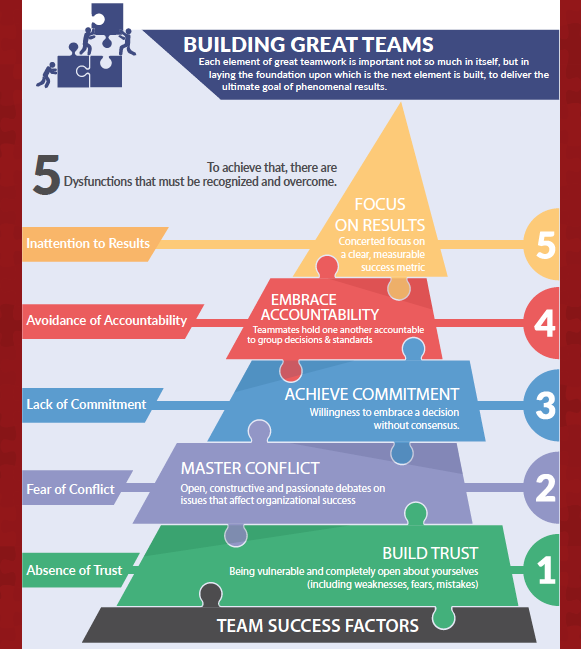 Copyright Skool of Happiness Pte Ltd
Copyright Skool of Happiness Pte Ltd
The Big Industries values, Share your Wisdom, Feed the Family feel and Dare to Grow, or in other words our DNA, are the fundamental beliefs upon which our business and our behaviors are based. They are the guiding principles for making decisions and are a source of inspiration and motivation.
The truth is that teamwork is at the heart of great achievement, however it can be hard to measure and accomplish. Yet, when we get it right, it can deliver seemingly-impossible results, and become a source of sustainable competitive advantage for our company in today's rapidly changing world. Teamwork can also deliver a sense of fulfilment for our people, with positive spill-over effects beyond the workplace.
At Big Industries we are inspired by Patrick Lencioni's book "The Five Dysfunctions of a Team". Using a fable, Lencioni illustrated how five elements; Absence of Trust, Fear of Conflict, Lack of Commitment, Avoidance of Accountability and Inattention to Results can cripple teams and how to overcome them. Each ingredient is important, not much in itself, but in laying the foundation upon which the next ingredient is built, to deliver the ultimate goal of results.
Building a real team requires members to invest time and energy, and to get uncomfortable. It's a continuous process and at Big Industries we are ready to do what it takes to convert the Five Team Dysfunctions into success factors.
1. Building Trust
Trust is the most important ingredient of teamwork, however there is no universal definition. Trust is used and understood differently by different people. Lencione refers to trust as the ability to be vulnerable, to readily face and be completely open about yourselves, including your weaknesses, fears and mistakes.
Vulnerability is hard to achieve. Most people find it hard to admit their mistakes or shortcomings. Developing genuine trust requires all team members to garner courage and become vulnerable first. The process takes time and requires ongoing maintenance.
At Big Industries we tried to accelerate by doing the following activities;
Sharing Personal Histories
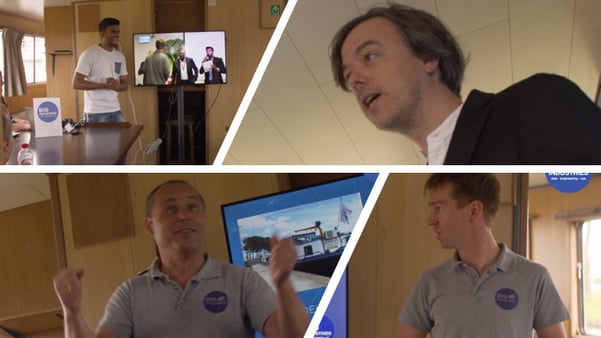 Sandeep, Robert, Matthias & Joris sharing personal histories during the Big Industries Academy
Sandeep, Robert, Matthias & Joris sharing personal histories during the Big Industries Academy
Getting vulnerable is something that cannot be rushed. Sharing Personal Histories helps people (a) to get comfortable about opening up and sharing something personal, and (b) develop understanding and empathy of others' past affects who they are today. For example, team members may have assumed that someone is cold and unfriendly. However when they realize that he merely has trouble expressing himself due to his strict upbringing, they immediately become more understanding and emphatic.
Behavioral Profiling
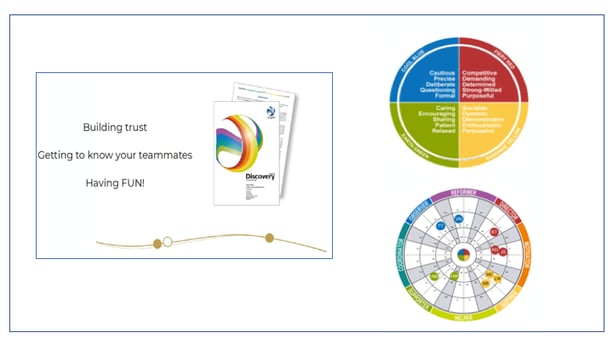 Copyright: Insights® Discovery
Copyright: Insights® Discovery
Some of the most effective and lasting tools for building trust on a team are profiles of team member's behavioral preferences and personality styles. These help break down barriers by allowing people to better understand and empathize with one another. There are numerous profiling tools available. The one used by Big Industries is Insight® Discovery. Everyone did their assessments prior, then we had an off-site meeting led by a licensed consultant to review and share our profiles.
2. Mastering Conflict
How does all of this relate to the next dysfunction, the fear of conflict? By building trust, a team makes conflict possible because team members do not hesitate to engage in passionate and sometimes emotional debate, knowing that they will not punished for saying something that might otherwise be interpreted as destructive or critical.
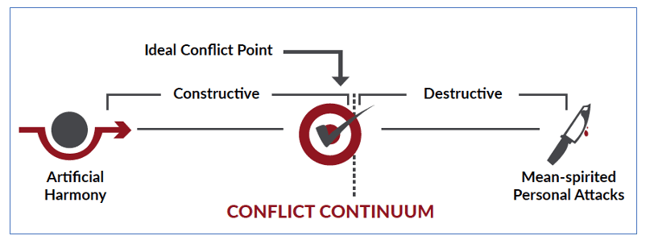 Copyright Skool of Happiness Pte Ltd
Copyright Skool of Happiness Pte Ltd
In theory, the ideal level of conflict would be at the end of the constructive zone, just before it tips into the destructive zone. However occasional destructive conflict gives the team an opportunity to work through difficult issues, building deeper trust and confidence. Although inherently uncomfortable, at Big Industries we encourage constructive conflict. Trust is an important (and necessary) foundation that allows members to push one another outside their emotional comfort zones. We are in support of putting critical topics on the table for discussion and do every effort to extract and exploit the ideas of all team members.
3. Achieve Commitment
By engaging in productive conflict and tapping into team members' perspectives and opinions, a team can confidently commit and buy in to a decision - even if it is different from their own suggestions - knowing that they have benefited from everyone's ideas. This is why constructive conflict is so instrumental. When team members are confident that all options, perspectives and opinions have been aired, they are more willing to stand behind the decision despite their initial disagreement.
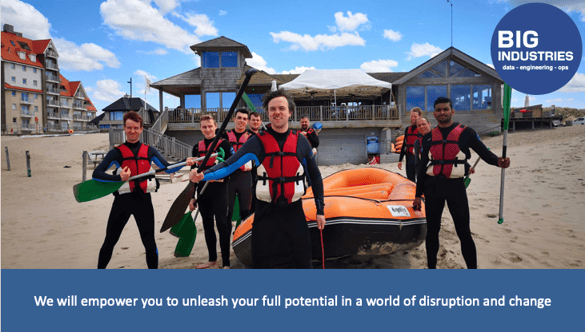
Besides commitments to specific decisions, every team member made individual commitments towards common and thematic goals. Team members offer to actively participate in the hiring process, running interviews with candidates or activating their personal network. Some help with attracting and mentoring student interns, others stand up and organize and speak at the Big Industries Big Meetup. Every member of the team has an individual learning path with a three year horizon, initiatives are taken to build a code repository, a knowledge sharing and training catalog. We want to give back to society by organizing charity events, members volunteer to organize after work drinks to Feed the Family Feel. Every quarter we run an Employee Satisfaction Survey, the results are shared and discussed in a transparent way.
4. Embrace Accountability
Accountability in the context of Patrick Lencione's book is about team members' willingness to hold one another to live up to the group's decisions and performance standards. Strong teams don't depend on their leaders as the main source of accountability; their true motivation to perform comes from peer pressure and the desire not to let down a fellow team member. Nonetheless, in order for teammates to call each other on their behaviors and actions, they must have a clear sense of what the team's values are.
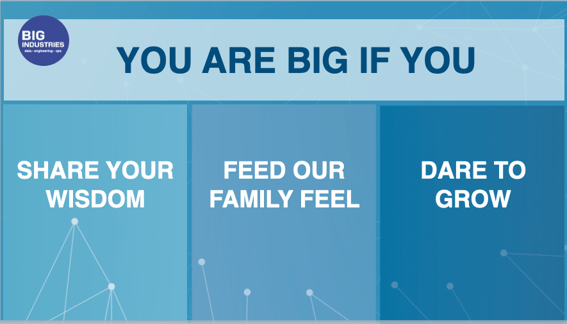
The Big Industries values, or in other words our DNA, are the fundamental beliefs upon which our behaviors and actions are based.
Share your wisdom
Feed our family feel
Dare to grow
At Big Industries we sponsor an environment where people dare to get out of their comfort zone, step up, build their expertise and become a go-to trusted advisor for all things data-driven.
There is no ambiguity about our DNA, and we encourage and allow the team to serve as the first and primary accountability mechanism.
5. Focus on Results
The ultimate dysfunction of a team is the tendency of members to care about something other than the collective goals of the group. An unrelenting focus on specific objectives and clearly defined outcomes is a requirement for any team that judges itself on performance. At Big Industries we are very clear about our ambition;
We want to become the number 1 trusted advisor in data solutions by better connecting with our customers, improve our services and further develop our people.
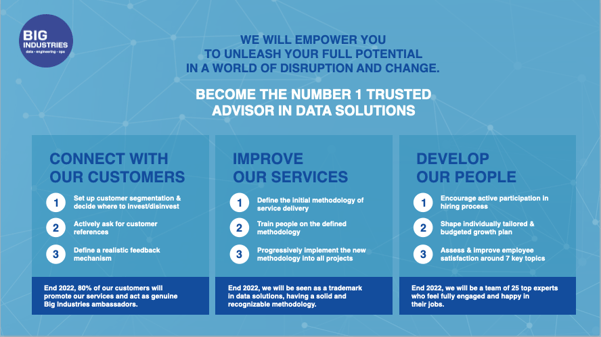
In order to realize our ambition, we set ourselves clear goals.
By end 2022;
• 80% of our customers will promote our services and act as genuine Big Industries ambassador.
• We will be seen as a trademark in data solutions, having a solid and recognizable methodology.
• We will be a team of 25 top experts who feel fully engaged and happy in their jobs.
We strive to make the collective goals of the group more important to each individual than individual members' performance. We reserve rewards and recognition for those who make real contributions to the achievement of our group goals.
Conclusion
As much information as is contained here, the reality remains that teamwork ultimately comes down to practicing a small set of principles over a long period of time. Success is not a matter of mastering subtle, sophisticated theory, but rather of embracing common sense with uncommon levels of discipline and persistence. Ironically, teams succeed because they are exceedingly human. By acknowledging the imperfections of their humanity, members of functional teams overcome the natural tendencies that make trust, conflict, commitment, accountability, an a focus on results so elusive.
Sources and acknowledgments:
• The Five Dysfuncions of a Team, Patrick Lencione
• Skool of Happiness Pte Ltd
• Insights Discovery
• Special thanks to the people from Insilencio who helped us to see the light

Matthias Vallaey
Matthias is founder of Big Industries and a Big Data Evangelist. He has a strong track record in the IT-Services and Software Industry, working across many verticals. He is highly skilled at developing account relationships by bringing innovative solutions that exceeds customer expectations. In his role as Entrepreneur he is building partnerships with Big Data Vendors and introduces their technology where they bring most value.




